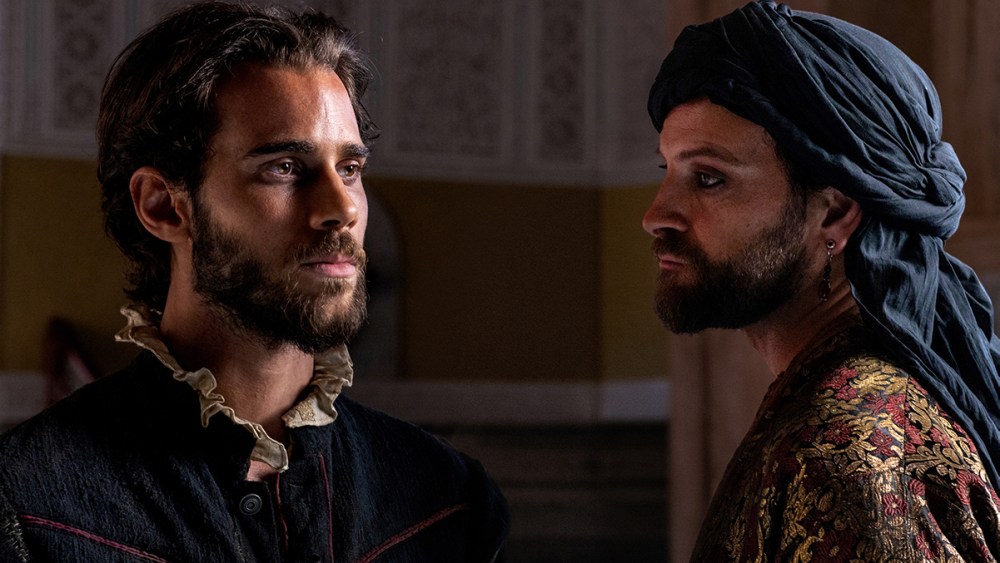“The Captive” offers the intriguing concept of “Don Quixote’s” author viewed through a lens more redolent of “Arabian Nights,” spinning tales to keep himself alive while a hostage of Moors in Algiers. But the known facts about this murky biographical chapter are vague, permitting writer-director Alejandro Amenabar much imaginative license, though he makes less of the storytelling-within-storytelling aspect than you initially expect. What emerges is a curious if entertaining bio-fiction with Miguel de Cervantes as protagonist in a convoluted costume intrigue, like a homoerotic spin on ye olde Western exoticizing of the Arab world– well-toned male bodies in the hammam substituting here for the traditional, scantily-clad Hollywood harem girls.
Those not expecting a more straightforward portrait of the man or his myths — Don Q. is little more than slyly referenced — should find enjoyment in this handsome, leisurely Spain-Italy coproduction. In the end, though, its offbeat approach doesn’t quite pull together enough to make a lasting impression, or even a fully satisfying diversion. Between its two TIFFs (a world premiere at Toronto’s film fest, then this week’s bow in Tokyo), “The Captive” has already opened in some territories and sold to several others, with Netflix claiming streaming rights in Latin America. The home screen may indeed suit it best, as the script’s episodic structure often plays more like a compacted miniseries than an epic feature.
Opening text informs us that as Christian and Islamic empires fought for control of the Mediterranean in the 16th century, captured ships’ occupants were frequently held for ransom, or sold into slavery. Such is the lot of young Miguel (Julio Pena Hernandez), who had recently suffered wounds in sea battle that rendered his left arm permanently inert. Waylaid by pirates while traveling from Naples to Barcelona, he manages to stay alive here by claiming that he is a “gentleman at arms, very important.” But the truth is that his family lacks the connections or wealth to free him. And the actual noblemen stuck waiting for monetary rescue amidst brutal conditions enforced by Algiers regent Hassan Baja (Alessandro Borghi) scorn Cervantes as a “nobody.”
Well-educated despite his modest background, our hero gradually wins over the bored hostages by telling tales — entertaining them with exaggerated accounts of his own adventures, or inventing new ones. That skill set attracts interest from “the dreaded Bey” himself, eavesdropping from a window in his luxurious quarters above the prison yard. Baja, aka Hassan Veneziano, was himself a multilingual European who managed to turn his initially-forced absorption into the Muslim world into a slow rise to power. He spies a kindred soul in Miguel… but he’s also a tough audience. When Cervantes pleases him, he earns a day of freedom, where he grows intoxicated by the surrounding city’s unfamiliar sights and surprisingly liberal (in some respects) culture. When Bey is displeased, however, the Spaniard is lucky to survive another day.
Nonetheless, the two gradually achieve a sort of intimacy, one that after a time turns physical and romantic. Even before they cotton to any such liaison, his fellow captives resent Cervantes’ special treatment — particularly the jealous, duplicitous friar Blanco (Fernando Tejero). Contrastingly supportive towards this aspiring “man of letters” is scholarly Father Antonio (Miguel Rellan), from whose extensive library Miguel extracts many of his stories. (There is little indication that the future world-famous author has many ideas of his own, despite occasional suggestive mind’s-eye glimpses of a windmill.) The foreigners, almost without exception, refuse to formally abjure Christianity, though that is one way to gain liberty. And Miguel himself is increasingly torn between loyalties, plotting escape plans even as he and the Bey appear to fall in love.
The petulant, back-stabby intrigue between various parties here sometimes makes the hero rather unsympathetic, with photogenic singer-actor Pena Hernandez’s puppyish turn not conveying a great deal of complexity, let alone artistic o intellectual potential. By contrast, Borghi limns a figure of comingled sensuality, threat and eventual poignance, without ever appearing to reach for effect. His role is really just a variation on the “crafty sheik” stereotype of yore, but he makes it persuasive. The large roster of supporting players is astutely cast.
What resemblance does all this have to Cervantes’ actual life? Not a lot — or at least little that can be substantiated. Amenabar seems to root his screenplay on conjectures about the writer’s sexuality, which many scholars consider latterday projection. Nothing inherently wrong with that, within “The Captive’s” fiction-friendly context. But despite the production’s accomplished period physical trappings, there’s an air of very 21st-century thinking here — particularly in depictions of gender-blur and adult same-sex love within the Arab world — that feels more like wish-fulfillment than the film is prepared to acknowledge. These elements might’ve felt like less of a stretch if the director’s screenplay permitted more flight into fantasy. But Miguel’s recited stories are rather pedestrian, and do not fully develop into a complementary parallel to the main narrative as in other films about famous authors and their creations.
In the end, this is both a daring imaginative leap, and not quite enough of one — “The Captive” never quite attains liftoff, despite a lush look and numerous moments of charming or dramatic impact. There’s too much contrivance on a scene-to-scene basis, and an inorganic feel to the general conceit. His own composer as usual, Amenabar here tends to underline the film’s shortcomings, rather than elevate its idiosyncrasies with an original score that’s too conventional by half. Yet “Captive” does feel like a labor of love for its writer-director, its conviction carrying us along on a smooth overall ride, even if the individual ingredients fail to entirely coalesce.

